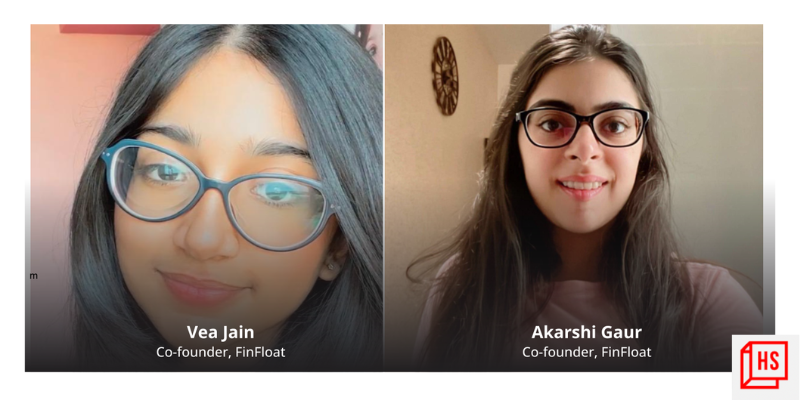Teens design gamified programme to help kids understand finance
Vea Jain and Akarshi Gaur, students of Thapar Entrepreneurship Academy, have developed FinFloat, a gamified learning programme that parents can use to teach 4-9 nine-year-olds the importance of money and saving.
As teenagers, Vea Jain and Akarshi Gaur recall conversations among their parents on managing finances, stocks, and investments. They found the discussions difficult to comprehend and quickly moved on to other topics, without giving them much thought.
When the two met at Thapar’s Entrepreneurship Academy (TEA), online, Vea and Akarshi zeroed in on a common interest on how to introduce the concept of finance and savings to children.

Akarshi Gaur
Eighteen-year-old Akarshi, who hails from Indore and is set to join University of Southern California this fall, says, “When I turned 18, I realised that even though I had a bank account and could begin earning soon, I didn’t know a thing about how to save or invest. In short, I didn’t know anything about dealing with money.”
Meeting Vea, a 15-year-old student of Oberoi International School, Mumbai, and brainstorming sessions with TEA mentors led to FinFloat, a gamified learning programme for children between the ages of four and nine.
Their mentors encouraged them to research the subject and conduct a survey among 100 parents.
The results were encouraging – 100 percent parents agreed that introducing finance and savings when children are young is extremely important, 85 percent felt decision making and budgeting is important for 4-11-year-olds, 95 percent were not aware of any product that taught children money matters, and 88 percent wanted limited screen time for their children.
The duo was also surprised to learn “that only one-third of adults in India understood financial concepts”. How then, would they impart financial knowledge to their children?
With the help of the team at TEA, Akarshi and Vea were able to shape their idea into reality.
“Our mentors, Anand Agarwal and Kunal Mehra, guided us to brainstorm, plan, price, manufacture, and pitch FinFloat. We always knew we wanted to bring change, be entrepreneurs, and it was made possible,” Akarshi says.
The girls pitched at the TEA investors’ panel and won Rs 40,000 funding, the seed money for the venture.
FinFloat’s idea is simple – it’s a box that contains a reward card, instruction card, sticker sheet, and 55 cards, divided into two sets. The aim is to teach children simple financial concepts. The two sets of cards include:
Learn cards: These have a variety of basic concepts with definitions and examples to help children get familiarised with finance. The concepts include needs and wants, delayed gratification, budget, savings, and more explained in simple terms. This learning is carried forward to the task cards when they implement what they learn.
Task cards: These cards have different chores (suggested by parents) along with points to be provided after each completion. These points will accumulate, and the child can redeem them by asking for something from the reward card. It is up to the child to save the points they earn for a bigger reward or to spend instantly. This teaches them how money works in the real world and decisions they should make when dealing with money.
“It is always better to make mistakes in the comfort of our homes than in the real world. Equipping the young generation with the right skills is what FinFloat aims to do,” Vea says.
Finding the niche

Vea Jain
The biggest challenges the young entrepreneurs faced was first finding the niche and then zeroing in on concepts.
“Our mentors helped us narrow down and finalise the format of the product. There were other challenges like finding the right manufacturer, but we found one in Mumbai,” Akarshi says.
Founded in 2021, has sold around 100 boxes so far. It’s priced at Rs 499 a box and available on their Instagram handle @finfloatlearnings.
“We’ve had people buying the product from cities like Pune, Hyderabad, Ahmedabad, Mumbai and more. Our online presence on Instagram has helped us reach out to a wider audience. Moreover, reviews by established mommy bloggers have also helped us gain traction,” Vea says.
The entrepreneurs don’t plan to stop here though.
“We have started getting in touch with schools, stationery shops, and ecommerce platforms to keep growing. Our plan is to sell 500+ boxes in the first six months of our launch. In addition, we intend to introduce collectibles, and manufacture boxes for ages 9-13 years as well.” Akarshi says.
When asked about competition, Vea is confident that their product is different from what’s available in the market.
“Being a combination of gamification, a family game, and a fun + learning model, FinFloat aims to be different. We are aware of the possibility of people copying us. We plan to introduce new modules frequently, and this will help us remain unique and relevant to our audience,” Vea says.
Edited by Teja Lele











